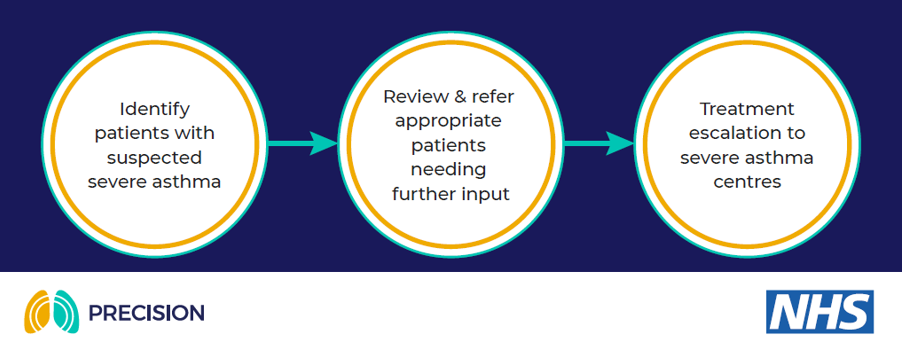UPDATE, SEPTEMBER 2022: The SPECTRA project was a finalist in the inaugural AHSN Network/NHS Confederation Innovate Awards in the Outstanding Collaboration with Industry category. More here.
This section is for primary and secondary care clinicians and how they can support earlier identification of patients who may be eligible for biologics to treat their asthma.
Early identification and healthcare professional training
- Identification tools – There is a need to improve identification of patients with potentially severe asthma who are inadequately treated/controlled so that their care can be optimised and if required, receive early referral to Severe Asthma Centres.
SPECTRA tool – Identification of SusPECTed seveRe Asthma in Adults
SPECTRA primary care clinical system resources have been developed to help identify adults with potential severe asthma, optimise and where required, refer them to severe asthma centres.
SPECTRA resources
- Data protection impact assessment template
- Investment and impact fund (pdf)
- Webinar recording, January 2022 – or click on the image below
- Slides from the January 2022 webinar
This is a Donated Service Programme funded by AstraZeneca, developed in collaboration with NHS England & Improvement and the Accelerated Access Collaborative (AAC). This service programme has been developed as a resource to support primary care. SPECTRA involves no processing of patients’ identifiable data. Only numerical aggregated data is uploaded to generate reports. Patient numbers between 1 and 7 are suppressed, aligned to NHS Digital’s approach to suppression of small patient counts. None of the parties will be able to identify any patients from this data. AstraZeneca does not have any access to any individual practice level data.
NHS Business Services Authority oral corticosteroid metric
The Oxford AHSN and Guy’s and St Thomas’ NHS Foundation Trust have worked with the NHS Business Services Authority (NHSBSA) to develop a new metric to help identify patients that are being prescribed quantities of prednisolone which might constitute a health risk.
Prednisolone is a short course steroid, which can be crucial in treating respiratory illnesses. However recent studies have shown that prescribing too many short course steroids could cause some adverse health conditions. This includes diabetes, cardiovascular illnesses, mental health disorders, musculoskeletal conditions such as osteoporosis and fractures, and many others.
The new metric looks at patients in England who have been prescribed prednisolone tablets, as well as an asthma/COPD medication in the last 12 months. It calculates the total cumulative dose, in milligrams, for the whole period. This will help clinicians to identify everyone at risk, and to prioritise those most at risk for review. At-risk patients may be suited to alternative therapies or clinical strategies.
This method also minimises the chance of including patients who are taking prednisolone for non-respiratory conditions, which can include Crohn’s disease and rheumatoid arthritis.
The new metric is available on the NHS BSA Respiratory Dashboard. For help with accessing the dashboard please see the NHS BSA Respiratory Dashboard Guidance.
Sign up for a Respiratory dashboard webinar hosted by NHS BSA.


